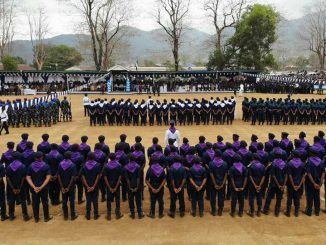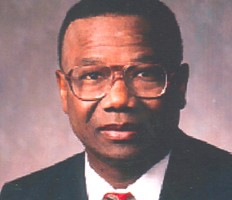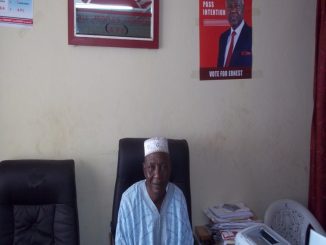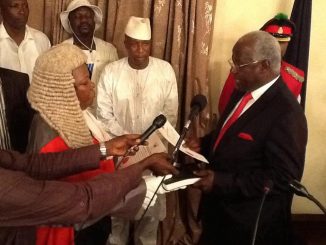
TODAY, we start our promised series on past Christmas holidays in Sierra Leone and Liberia.
Let it first be established that Christmas is a celebration of the birthday of our LORD and Saviour Jesus Christ who came on this earth to save man from sin. Any Christmas without Jesus Christ is like tea without sugar. Santa Clause is not the cause celebre of Christmas. Jesus Christ is the reason for Christmas. The world should do all in its power to place Jesus Christ back in Christmas. Though as a christian today, this is the belief I hold dearly to my heart, during the formative years of every kid who grew up in Sierra Leone or Liberia, there were memorable days of Christmas where there was a rich interplay of tradition , culture and national and family life. It is the amazing euphoria, animation and joy that I seek to recapture in these nostalgic reflections. It is by no means a manifestation of my present beliefs about Christmas and how it should be celebrated. This is only a historical account of past Christmas celebrations. At the end of the series, I will briefly enumerate my beliefs, but right now, let us go sentimental and recall how we and the people around us used to enjoy Christmas in the good, old days in Sierra Leone and Liberia, before one understood the true meaning of the season. Please feel free to join the nostalgia by providing comments under the article.
In order not to glorify Satan, I will use the word DEBUL instead of DEVIL.
Below is an article I wrote many years back on Christmas in Sierra Leone. I have updated and embellished some of the information with more facts and illustrations.
Nostalgia : Reflections on past Christmas holidays in Sierra Leone and Liberia : Part 1
By KABS KANU :
There was a time when Christmas was so enjoyable in Africa that nobody gave a heck about life abroad. When I woke up today, Christmas Eve, and heavy rains drops petered down my rooftop, I could not avoid feeling out of sync. That was not the kind of weather I grew up to be accustomed to during Christmas in Africa.
In Africa, it seemed the weather (nature)and the Xmas festive atmosphere interplayed with each other to sustain the perfect state of excitement that swept in with the Yuletide season. Early in the morning, it is dew , falling at times like snow flurries , especially at the then thickly-wooded Bo Reservation , to be quickly replaced at sun-up by beautiful sunshine and at night there was that wonderful moonshine under which those enthralling moonlight picnics were held in Freetown , like the “foufulay” dances in thatched canopies in Bo . Of course, Americans too would trade anything for that glorious white Xmas, the kind we had before when snow fell on Christmas day in New Jersey for the first time in many years. Americans enjoyed a fantastic thrill because they had been dreaming of a white Christmas.
For me, though, a typical African boy, who grew up in communities where people in those days made a religion out of enjoying roaring Xmas sessions , the images of past Xmas holidays would never dissipate from my memory.
I am a member of the Purple Haze and Super Combo generation —The generation in Sierra Leone that is walking around filled with nostalgia about how life used to be “sweet” in Sierra Leone before the politicians, soldiers and rebels destroyed what was a real Paradise on earth. Our generation believed that it enjoyed the best moments in the history of our nation. There is no member of this generation who does not have an interesting story to tell about how life used to be “enjoyable” in Sierra Leone. This is the generation that dictated the pace of life in the 1960s and 1970s.
Christmas, for me, always holds wonderful memories of people caught in the throes of joyful celebrations of a season whose religious significance many of them hardly knew. To them, it is just that season called Christmas that was jammed with festivities and mindless enjoyment of life. .That was all. It was the season when everybody was in ecstastic, bouyant and jubilant mood ; when everybody seemed more pleasant than they normally were ; when , if you lived in Freetown then, it was jampacked Xmas activities , with Christmas window- shopping trips, moonlight picnics, parties, discos and afternoon jumps, while the pubs and clubs balled like they have never done all year. It was also the season of generosity, when people shared gifts or Christmas cards and other pleasantries. It was a pride to be seen clutching that shopping bag from PZ, Kingsway, Colisee, Petit Paris, A. Genet etc .
I grew up at Pratt Lane in Freetown in the mid to late 1950s and early 1960s before my father, who worked at State House, was later transferred to the Governor’s Lodge at Reservation, Bo, by the late Governor Sir Maurice Dorman .
Pratt Lane was the very epicentre of Christmas celebrations in those days. The enjoyment started from school , especially during the closing program for Christmas. In those days, schools closed around December 12. I attended Fergusson Street Municipal School then and the closing ceremonies were always memorable–concerts, games in clasrooms, a heavy feast during which the most delicious jollof rice imaginable in those days was served. I am still asking what ingredients they used to have in jollof rice in those days. The hog foot and cow beef tasted better and the jollof rice itself more red than today’s. I remember the euphonious Christmas carols the choral group sang in the assembly hall as we feasted in our classrooms. The colonial government gave schools money to treat their students on the last day of school before the Christmas vacation. . There were Christmas gifts also that were distributed. I wonder who used to provide the funds for the toys we used to be given.We used to extol the Head Mistress , Mammy Pratt , for such profound generosity, but later when we grew up,we were told that the government provided the money.
Christmas at Pratt Lane then was centred around the many jollays, ojehs and Hunting Society groups that existed around the Lane itself, Fergusson Lane, Peter Lane and Portuguese Town ( which we heard pronounced those days “Potoki Togn” ). The bulk of the young men belonged to these Huntings , Jollays, Ojehs and what- have -you and all you heard in those days was entertaining brags about plans to outdo other groups for Christmas. People did not have the kinds of stress that mark life in Sierra Leone and America today and it seemed like all they talked about in those days was how to enjoy Xmas “to totality “. In those days, it seemed that nobody died . One hardly heard about deaths and fumerals. All one heard was the din of the festivities .
In fact, in those days, Christmas started early , around mid-November , when the SLBS started playing Christmas carols ; store-keepers begun decorating their shops with twinkling lights , buntings and ornaments and started advertising Christmas bargains. As December sets in, street hawkers will join the fun , ringing bells and trying to pass off good bargains on their wares. The streets would be full with people shopping and downtown will be colorfully choked not only with shoppers but traffic. It was also time to be more guarded with your wallets , purses or handbags ( In the case of women ) as con men and snatch-and-run gangsters preyed on innocent and unsuspecting people caught in the seething frenzy of Christmas preparation.
Pratt Lane had its own Hunting Group and Ojeh Society .The Hunting Debul, led by the famed Johnny, whose mother , Mammy Ningbo , was head of the Pratt Lane Market , came out every Christmas day, but there were times when it was a “Fiary” that was brought out. I used to love the fairy procession more than the Hunting because it was more peaceful and orderly. Nothing was more pleasurable to us as kids than “following Debul”( Dancing behind the debul as the procession, led by the agbas holding horse tails and the “Debuls”, jubiliated through the streets of Freetown . If you did not “fallah Debul” on Christmas day,you were counted nothing and your colleagues teased you. Some bigger ones in fact graduated from following the small street debul to the more grandiose exercise of following the East End Paddle Debul or the West End Bloody Mary. In those days, if you knew nothing of Remie—the head of the West End debul, you were counted as “buff” ( of no consequence).Some parents however used to beat their kids for following the bigger debuls because it was dangerous for kids. Being trampled by the throng was a major fear but I did not know anyone in those days who ever got trampled. But later in the late 50s these debuls started fighting when their paths crossed and in 1976, the government banned processions of masked devils. There were often bitter clashes between the Bloody Mary of West End and East End Paddle around Mountain Cut when their processions crossed paths. To forestall this problem, Bloody Mary established a rest stop around Mountain Cut to allow the East End Paddle procession to pass unimpeded.
The build-up to Christmas was always fascinating and memorable . People would buy clothing materials to be sewn by tailors. In those days, tailors made fortunes when Christmas approached . These dresses were what they had to wear on Christmas day, and everybody tried their best to make it groovier than the next person’s.Our parents had tailors prepare family ashoebis ( Holiday dresses that were uniformly worn by other family members ). At nights, we the kids enjoyed one of the finest traditions of Christmas — going out to sing carols. We formed choral groups and went door-to-door singing carols and since it was the season for generosity, we were given money which we shared among ourselves later. Some churches also sent out choral groups with musical instruments to spread the Christmas joy house-to-house or block-to-block. They were more euphonious and melodious and put you in the Christmas spirit.
In the mid-70s, goombay groups called “Gee Body Watta ” (Replenish the body with water ) played a leading role in sharing festive joy in Freetown. They held street side sessions and women dressed in their traditional Creole print dresses and kabaslots competed with one another over who could gyrate their bodies better to the thumping drums of the Gee Body Watta groups. Their songs were often satiric, ridiculing sugar daddies, unfaithful men and loose women.
On Christmas Eve, we stayed home to help our parents prepare the bounteous food that the families would have to share with each other. We the kids slaughtered the many chickens or ducks.I will never forget the stupendous Christmas day feasts before leaving to “follow Debul”.It was usually the most delicious food of the year. It was usually a feast in the true sense of the word. We did not only have to eat what our parents cooked , but foods sent by goodwill neighbors with whom our parents shared foods.
In those days, family members that one had not seen for long came to visit to help enjoy the heavy Christmas feasts. While they later sat down with parents to drink and enjoy good company, we the kids are dressed up and made to go visit other family members. That was during pre-teen. With our toy water guns we probably got for Christmas we will have lots of fun with our friends. There were no computer games and IPods in those days but we had sufficient fun playing with our toy guns, firecrackers and “runaway boys” ( a firecracker that made a swishing sound, meandered into the air before exploding ). In the 1970s, President Siaka Stevens’ government banned these Christmas fireworks, especially the very loud one called BANGER for security reasons.
If we did not go around visiting families, we would follow debuls ( Dance in debul processions ). That was around ages 9 to 10.
In those days, these debuls will be all around on Xmas day. As soon we wake up early in the morning to start helping our parents prepare the Xmas meal, the debuls will start coming to the yard to dance. Some will be fully masked and dressed but with just three or four people behind them while others will have bigger crowds dancing behind them. In some cases, it will be a lone reveler , or somebody who had tarred his face with charcoal with a rope around his waist, singing : “Ah go fodom” ( I want to fall down ) ,while his mate holding the rope will sing back : “Nor Fordom” ( Do not fall down ). The two will go through the interesting motions of one person attempting to fall and another restraining him , and people will give them money. They will go house-to-house performing. In some other cases, it would be little kids beating bottles with pebbles and singing folk songs. They too will be given money after performing and then they will leave for the next house .
Our neighbor, Pa. Pratt, after whom the street was named, would by then have returned from church with his family, dressed in long , black Tubman-like tailcoat with a ten-ton hat . His house was fenced with zinc and it had a gate and the debuls could not go inside to dance . He was a conservative , old creole man that loved his privacy but would hang around the gate for a while to enjoy the fun and even dole out money to the revelers .Then he will retire into his house to enjoy his fufu and bitter leaves soup and he could be heard loudly singing christmas carols being played by his old, battered colonial-styled gramaphone. He will later entertain a families that always came to visit him during holidays. Mammy Pratt would be the busiest woman then, serving ginger beer, cookies and plates of fufu and bitters.
SEE CONTINUATION ON MONDAY






Leave a Reply